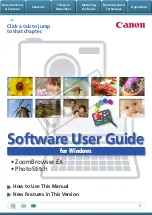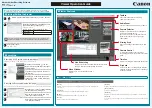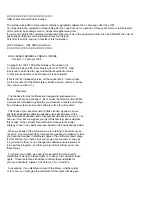
270
Copyright © Acronis, Inc., 2000-2010
The top part of the view contains a disks and volumes table enabling data sorting and columns
customization and toolbar. The table presents the numbers of the disks, as well as assigned letter,
label, type, capacity, free space size, used space size, file system, and status for each volume. The
toolbar comprises of icons to launch the
Undo
,
Redo
and
Commit
actions intended for pending
operations (p. 282).
The graphic panel at the bottom of the view also graphically depicts all the disks and their volumes as
rectangles with basic data on them (label, letter, size, status, type and file system).
Both parts of the view also depict all unallocated disk space that can be used in volume creation.
Starting the operations
Any operation can be launched:
From the volume or disk context menu (both in the table and the graphic panel)
From the
Disk management
menu of the console
From the
Operations
bar on the
Actions and Tools
pane
Note that the list of available operations in the context menu, the Disk management menu, and the
Operations bar depends on the selected volume or disk type. The same is true for unallocated space as well.
Displaying operation results
The results of any disk or volume operation, you have just planned, are immediately displayed in the
Disk management
view of the console. For example, if you create a volume, it will be immediately
shown in the table, as well as in graphical form at the bottom of the view. Any volume changes,
including changing the volume letter or label, are also immediately displayed in the view.
6.11.5
Disk operations
Acronis Disk Director Lite includes the following operations that can be performed on disks:
Disk Initialization (p. 270) - initializes the new hardware added to the system
Basic disk cloning (p. 271) - transfers complete data from the source basic MBR disk to the target
Disk conversion: MBR to GPT (p. 273) - converts an MBR partition table to GPT
Disk conversion: GPT to MBR (p. 274) - converts a GPT partition table to MBR
Disk conversion: Basic to Dynamic (p. 274) - converts a basic disk to dynamic
Disk conversion: Dynamic to Basic (p. 275) - converts a dynamic disk to basic
The full version of Acronis Disk Director will provide more tools and utilities for working with disks.
Acronis Disk Director Lite must obtain exclusive access to the target disk. This means no other disk management
utilities (like Windows Disk Management utility) can access it at that time. If you receive a message stating that
the disk cannot be blocked, close the disk management applications that use this disk and start again. If you
cannot determine which applications use the disk, close them all.
6.11.5.1
Disk initialization
If you add any new disk to your machine, Acronis Disk Director Lite will notice the configuration
change and scan the added disk to include it to the disk and volume list. If the disk is still not
initialized or, possibly, has a file structure unknown to the machine system, that means that no
programs can be installed on it and you will not be able to store any files there.
















































